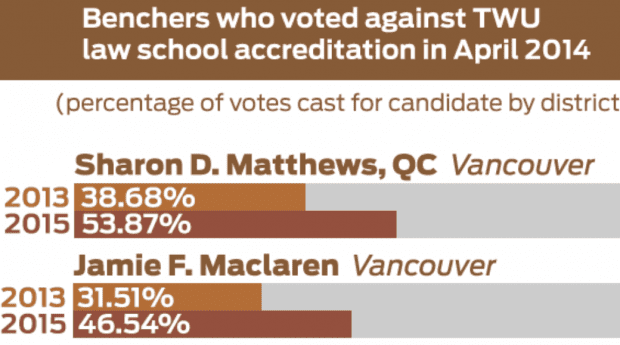A Vancouver lawyer who opposes the accreditation of Trinity Western University’s (TWU) proposed law school says the results of the BC law society’s 2015 election affirm the profession’s commitment to inclusive education.
“I think, reading into the numbers of the recent election, especially in Vancouver, you can see that those of the benchers who voted to not accredit TWU . . . were elected with a greater number of votes than the others,” says Jamie Maclaren, who was re-elected as a director (also called a bencher) for Vancouver.
“I think that’s a positive reflection of the profession’s general desire to keep legal education and the administration of justice on the path of true inclusion and equality,” he says.
The Law Society of BC announced the results of its mail-in ballot on Nov 18, 2015.
The crux of concern is TWU’s requirement that students must sign a covenant in which they agree to uphold Christian biblical teachings — including abstention from sex outside of a heterosexual marriage — as a condition of admittance. According to the student handbook, failure to uphold these rules could result in discipline, dismissal or a refusal to readmit a student to the Christian university.
BC law society directors initially approved TWU’s request for accreditation in April 2014, but an outcry from the society’s members forced them to reconsider. The directors voted 25 to one to rescind their approval in October 2014.
Four of the six benchers who opposed TWU from the outset stood for re-election. All four were returned with an increased share of votes compared to their last election in 2013. Three of them, including Maclaren, received the highest number of votes overall.
“I think it’s not a matter of other benchers being punished for their decisions; there’s fundamental respect within the profession. But I think those of us who voted not to accredit were rewarded,” Maclaren says.
However, Maclaren also points out that benchers who voted in favour of accrediting TWU in April 2014 also received a healthy number of votes, particularly in districts outside Vancouver.
Eleven of the 20 benchers who initially supported TWU also stood for re-election. Seven were re-elected with an increased share of votes locally in their districts, though they placed lower than anti-TWU incumbents in whichever district they ran. Two were re-elected by acclamation, one was re-elected by a smaller percentage in his district compared to his showing in the 2013 election, and one incumbent, Jeevyn Dhaliwal, was defeated.

(Though seven of the 11 benchers who initially supported accreditation for TWU increased their vote share in their districts, none won more votes than anti-TWU incumbents in those districts where they ran./Nathaniel Christopher)
Victoria lawyer Michael Mulligan spearheaded the petition that pushed the benchers to reconsider their TWU position after the April 2014 vote.
“Certainly the views of benchers and members on this issue were a factor in the [bencher] election,” says Mulligan, who sought election to the board partially as a result of the April 2014 decision, but was defeated.
“It was an important issue but not the only one,” he says.
Mulligan, who ran in Victoria, was defeated by the district’s two incumbents. Rishi Gill, a Vancouver lawyer who also ran as a result of the benchers’ initial decision to accredit TWU, was defeated as well.
“I can’t speak to why people voted [the way] they did,” Mulligan says. “In Victoria I don’t think there’s any example of an incumbent being knocked off by a challenger,” he notes, “and that challenge continues this time as well.”
Mulligan believes the Trinity Western discussions and votes have been healthy for the legal profession.
“The profession is now younger and more diverse than it has been in the past, and I think the response to this issue has been a function of this diversity,” he says. “More progressive views are more common now than they would have been at one point. I think we’re on the right side of history.”
Trinity Western University declined Daily Xtra’s request for comment on the BC benchers’ election.

 Why you can trust Xtra
Why you can trust Xtra


